
The Post-Conflict Research Center (PCRC) and the non-profit Impunity Watch held in March this year a two-day conference on atrocity prevention. Entitled, “Building a Common Agenda for Prevention in the Western Balkans”, the conference took place in Montenegro’s capital of Podgorica. The conference gathered representatives from civil society across the ex-Yugoslav region and beyond. This was a conference with a multi-pronged aim: strengthening regional cooperation, identifying future joint actions, and fostering solidarity with and among post-conflict societies.
“This meeting is timely. We are facing many challenges. The latest report by the Commissioner for Human Rights, Miss Dunja Mijatović, has highlighted some crucial negative trends in the region, including the increasing glorification [of war criminals] and revisionism by political and intellectual elites,” said Velma Šarić, President and Founder of the PCRC.
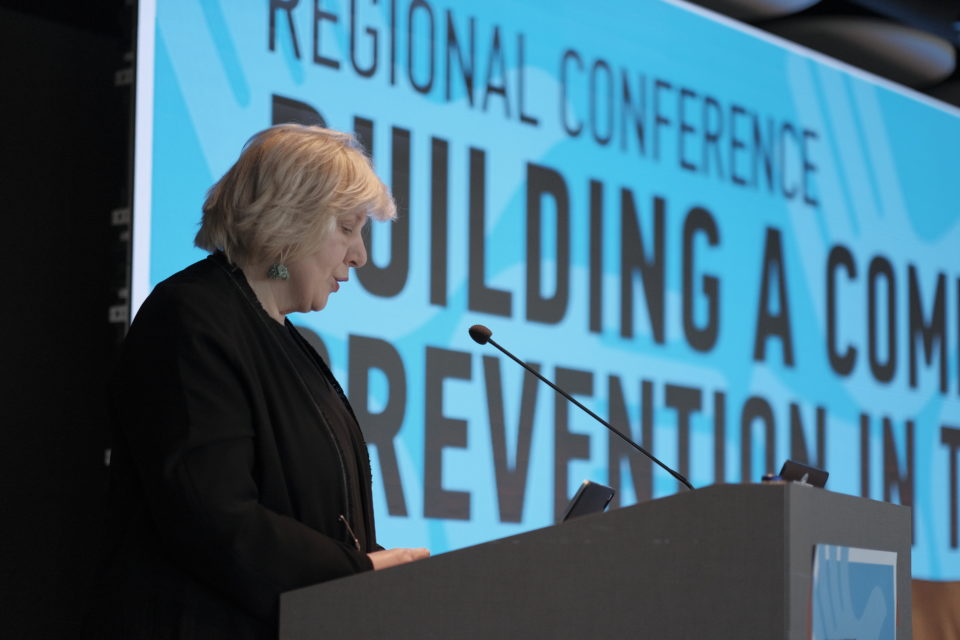
Šarić discussed the rise in hate speech, the persecution of activists, segregated educational systems, the destructive transgenerational dimension of conflict, gender-based violence, and the distortion of narratives through the media. These are just some of the issues the Western Balkans face. As a result, she added, it is crucial to strengthen solidarity between civil society representatives and the international community in order to identify common actions, strategies, and methodologies for the Western Balkans Coalition for Genocide and Mass Atrocity Crimes Prevention (CGMAP).
The CGMAP was established by the PCRC and the United Nations (UN) in 2017, in order to facilitate transnational collaboration to prevent atrocities. This followed six years of PCRC-led seminars on genocide prevention, attended by more than 120 civil society organizations.
Resisting Revisionism and Triumphalism
The topic of revisionism and genocide triumphalism was addressed in the panel entitled “Civil Society & Prevention: Tackling Increased Denial and Revisionism”. The sentiments expressed during the panel were also echoed by keynote speakers outside of the panel.
Thomas Unger from Impunity Watch said he regards the rise in denial and revisionism as a symptom of the failures of both domestic governments and the international community.
“The primary responsibility lies with the governments. Additionally, I believe that the international community has made a lot of mistakes here. It’s interesting to see that the failures of the international community, especially in transitional justice, are always left out,” concluded Unger.
Sonja Biserko from the Helsinki Committee for Human Rights in Serbia emphasized the importance of civil society in the region as well as international groups, individuals, journalists, and others who contributed to research during the 1990s Balkan Wars. She added that the wars were the most documented in history, but that now is the time to confront misinterpretations.
“Civil society plays a crucial role in the process of facing the past and building a future based on truth and justice,” said Biserko.
The importance of civil society was echoed in a video message to the attendees of the general conference by Alice Wairimu Nderitu, the Special Adviser on the Prevention of Genocide of the UN Secretary-General. Nderitu addressed representatives of civil society, who themselves often represent victims and survivors.
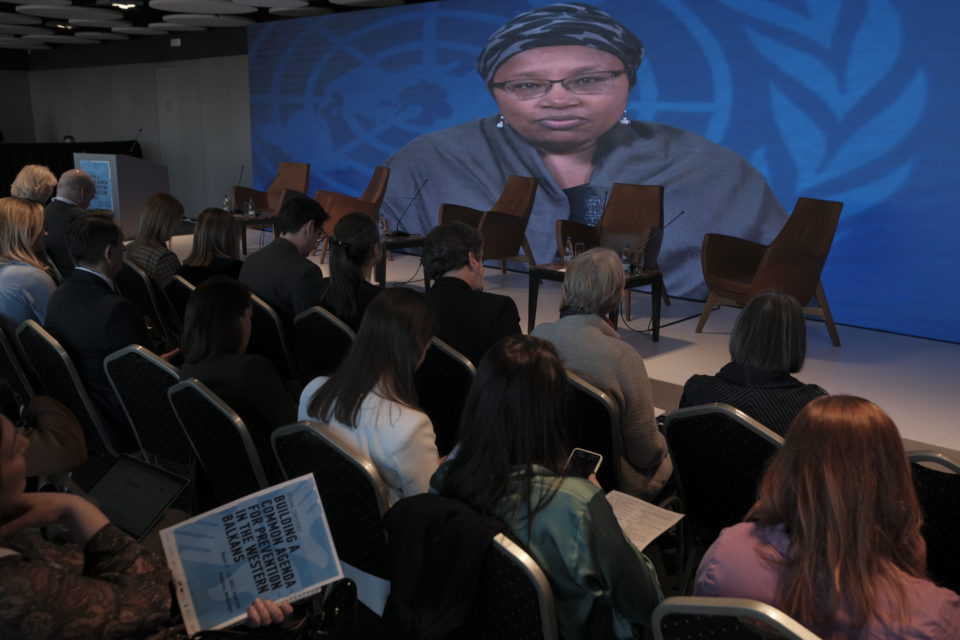
“Together, you’ve been at the forefront of advocating and promoting accountability and of supporting reconciliation, memorialization, and remembrance. And for this you have endured challenges and often no risks. I commend your work and your courage in the face of many challenges,” stated Nderitu.
She reminded the conference that it has been almost two decades since the end of violent conflict in the region and almost 30 years since the genocide in Srebrenica, highlighting the growing need for collective efforts to facilitate atrocity prevention.
“The lack of accountability and full reconciliation, as well as the ongoing distortion and denial of genocide, war crimes and crimes against humanity, all point to indicators of risk for such crimes as set out in the framework of analysis for atrocity crimes developed by my office, which I know your coalition is using to advance your work in the region,” said Nderitu. She emphasized that monitoring, analyzing, and ringing alarm bells are what is needed for civil society to not be passive in the presence of risk factors.
Nataša Kandić from the Humanitarian Law Center (HLC) highlighted the difficulties faced by civil society in the region, emphasizing that after more than a decade, it is confronted with empty promises from the authorities.
“Civil society, especially from the RECOM reconciliation network, continues to do a good job. Maybe I could say replace an institution because only the reconciliation network managed to register all victims, for example, in Kosovo. We have the [registered] victims from all countries without thinking about ethnic borders. And with this unique success, it is a very important job. But it’s not enough, because now we have a completely new ball game with denial instead of transitional justice prevailing in reckonings with the past,” stated Kandić.
Ahmed Kulanić from the Sarajevo Memorial Center emphasized the lack of a fight against denial and revisionism, including the lack of production of relevant materials.
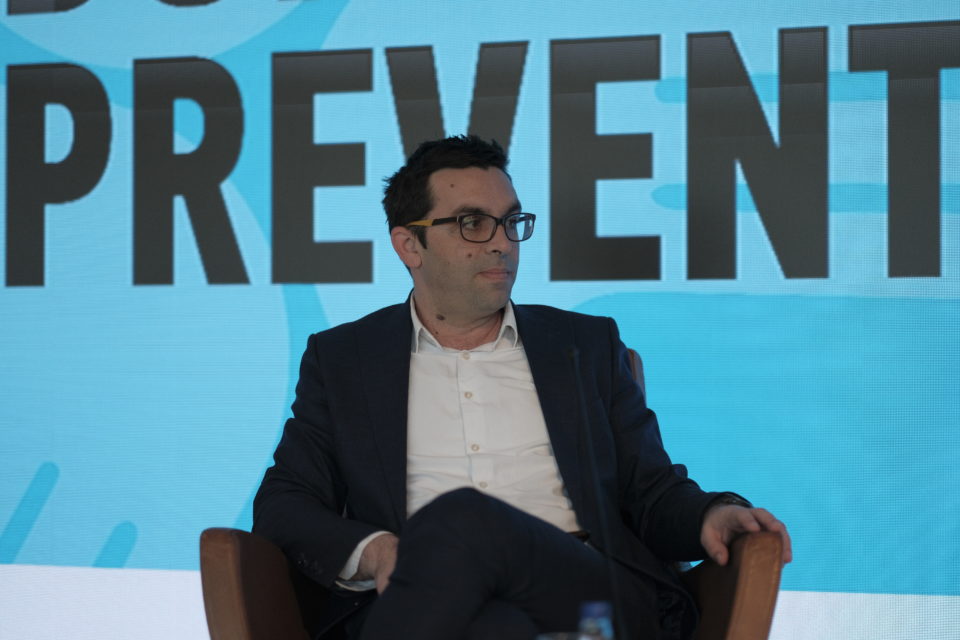
“So, we allow war criminals to be hosts on TV shows, we allow them to speak. Then someone extracts their words, shares them on social media. And in a way, I am blaming ourselves more than our institutions. Speaking on behalf of my institution, we, for the last 27 years, have not produced relevant materials to fight that denial and revisionism,” said Kulanić.
Marlies Stappers, Executive Director and Founder of Impunity Watch, expressed deep concern about the glorification of war criminals and the denial of facts, emphasizing that this has a serious impact on human rights and peace in the region. In her speech to the general conference, she also highlighted the importance of long-term approaches and solidarity. Stappers stressed the importance of including victims in transitional justice processes.
“I think if we keep the victims really at the heart of our strategies, it’s easier to stay the course, to stay with the root causes because victims don’t forget. They know what the needs are. Then they know what is needed to transform,” said Stappers.
In her final address in the region as the Commissioner for Human Rights of the Council of Europe, Dunja Mijatović noted the importance of supporting peacebuilding projects that ensure crimes are not forgotten. She particularly highlighted the role of art in confronting the past, referring to her visit to the National Theater of Montenegro, where she attended a play about the Štrpci massacre (Eastern Bosnia, February 1993). “We got to experience a small amount of the suffering that is still present with the families and survivors of this horrifying crime,” Mijatović recalled.
Speaking about the responsibility of political leaders, Mijatović stressed the need for a change in the course of governments in the region. She noted that there is no excuse for inaction or shifting responsibility to previous administrations. Also on the agenda was the importance of the participation of young people in the building of the region’s future.
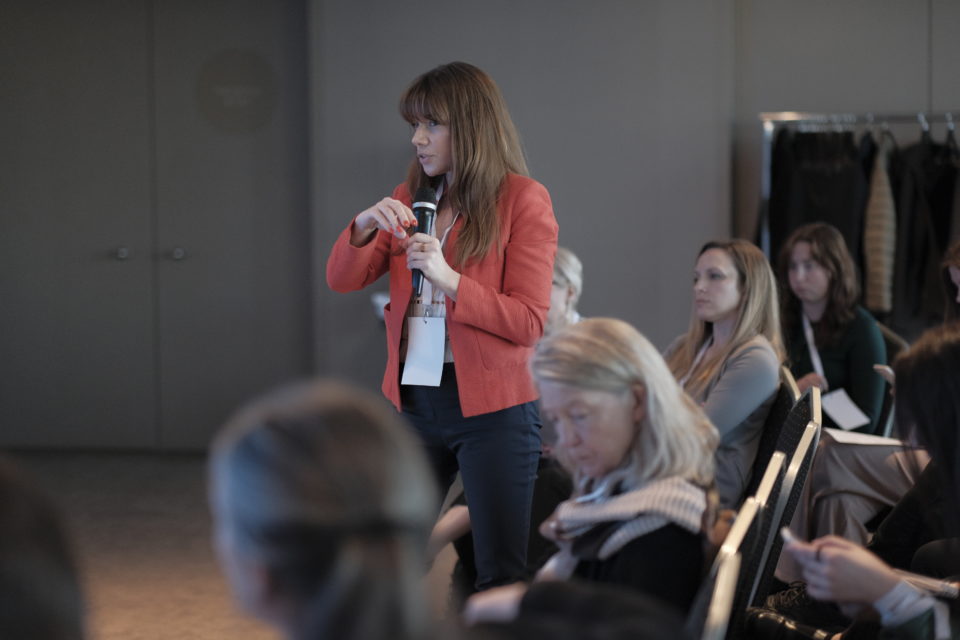
“If you are not reachable, if you are not a person that can be really there when it’s needed, then we foresee additional problems, because this is also to be together, to be at the forefront,” concluded Mijatović.
The panel concluded that transitional justice requires broader and more complex action. There was an emphasis on the media, rule of law, civil society, and connecting these aspects via engagement from the international community.
Victims and Reparations
The issue of reparations was the subject of debate in the second panel entitled “Victims & Reparations: A Grassroots Perspective”. Judge Graciela Gatti Santana, President of the International Residual Mechanism for Criminal Tribunals (IRMCT), emphasized the importance of a positive judicial legacy for the Western Balkans.
“It is clear that our work does not end with the pronouncement of a judgment. As a custodian of this legacy, the Mechanism remains resolute in its mission to preserve and ensure access to the judicially established facts, both as a tribute to the victims and so that the broader goals of international criminal justice, including prevention, may be better served,” said Santana.
Stappers emphasized the importance of considering reparations, emphasizing that they have the potential to provide support to victims at various levels and to bring about tangible results that can change victims’ lives. She believes it is important for reparations to be inclusive and to encompass all victims, and that their implementation should strive for social inclusion and the prevention of further division.
Selma Korjenić from the Bosnian branch of the NGO, Trial International, emphasized that civil society and victims must be actively involved in the advocacy of reparations.
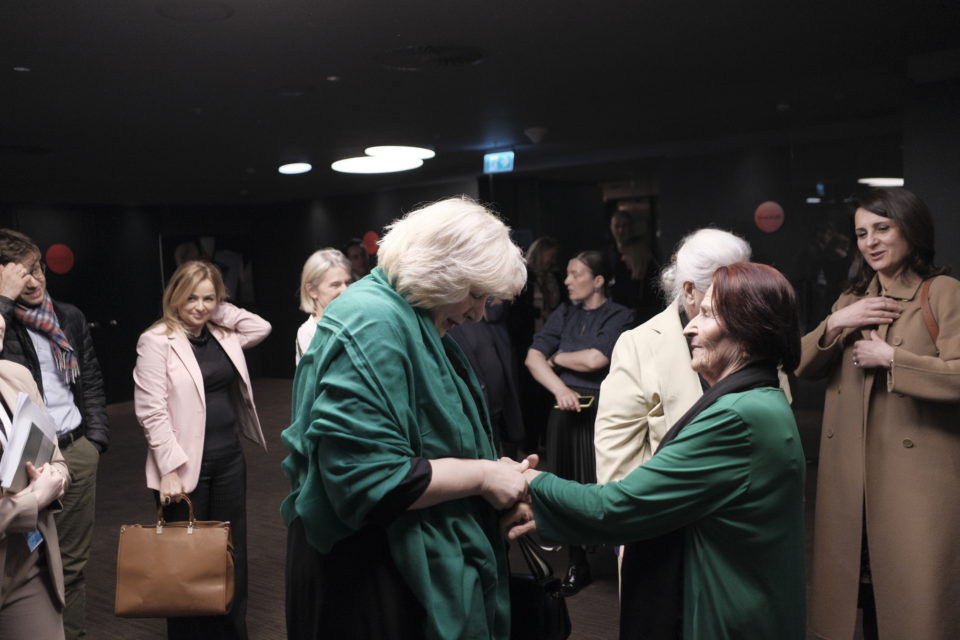
“Working on reparations as part of facing the past and transitional justice processes in the Western Balkans is not easy. We need to make sure, in daily life, that we ensure survivors’ needs based on a survivor-centered approach. They are capable of being their own voice,” said Korjenić.
Daliborka Uljarević, from the Center for Civic Education (CCE), Montenegro, noted that there is a systemic neglect of issues related to facing the past and reparations, which further complicates the efforts of civil society in that direction. She also points out the sociopolitical regression that has been unfolding in recent years, which has seriously undermined the previous achievements of human rights and victims-led organizations. Referring to research conducted last year by CCE, Uljarević discussed the deep polarization of Montenegrin society. She emphasized the importance of education as a key factor in the process of facing the past and ensuring fair reparations for war victims.
Branko Ćulibrk, from the Youth Center KVART, Bosnia and Herzegovina, believes that working with the youth is crucial for achieving societal change. “From the very beginning we have really created programs for working with young people and we simply figured out that there are some things we just can’t do alone. It is important to involve the local community in order to truly change society,” Ćulibrk emphasized.
The panel stressed the need for a broader political agenda on reparations, focusing on victims but also involving the wider community and social structures. “Justice means acknowledgment. Activism, political approaches, and regional integration can bring about significant changes. Collaboration with international partners is crucial for achieving progress,” concluded the panel moderator, Stappers.
Psychosocial Support and Education
In the panel “Healing (from) the Past: Psychosocial Support and Education”, Margareta Blažević from the Youth Initiative for Human Rights (YIHR) Croatia noted the importance of education and working with young people on topics related to confronting the past and transitional justice. She highlighted that working with the youth is particularly important because young people are not only a resource for society in the present but also representatives of the future we aspire to.
Šarić also noted that the PCRC has utilized innovative mechanisms in its work, both formal and informal, all with the aim of reaching out to young people and empowering them. She highlighted the importance of regional cooperation and a multidisciplinary approach.
Jasna Zečević from the women’s rehabilitation center, Vive Žene Tuzla, explained that the center is working on establishing cooperation with other organizations to support witnesses, educate professionals, and work on recognizing trauma and human rights. She added that it remains important to work on recognizing trauma for all sides of the conflict and finding common ground.
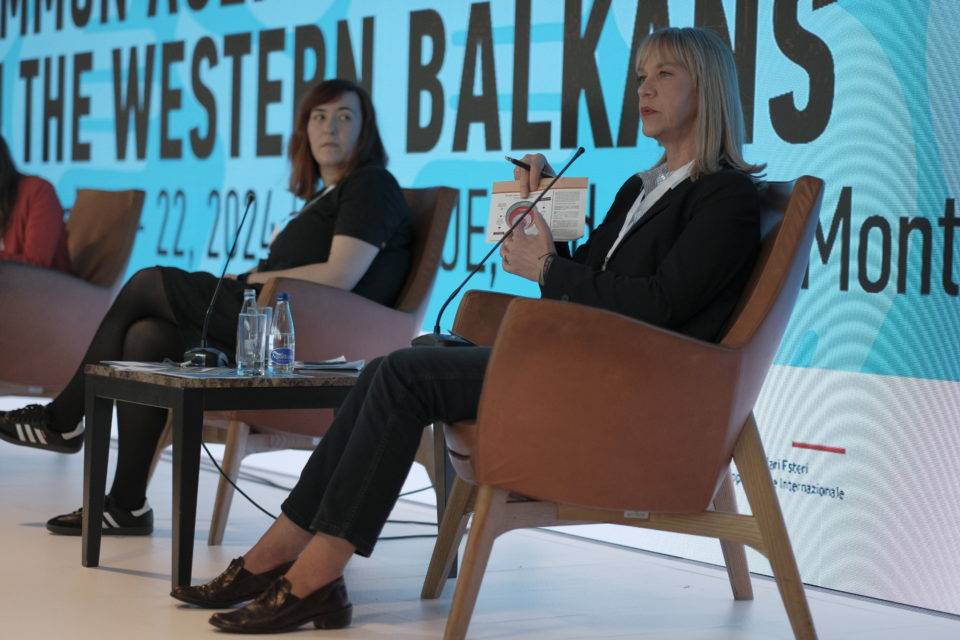
Jasmina Lazović, representing the cultural foundation Heartefact from Serbia, emphasized that very little has been done to achieve this at an institutional level. Rather, it has been civil society which has actively opened up the discussion about the past in order to confront its legacy. She highlighted the role of art in this process, stating: “Art serves as a powerful tool for telling facts, sharing experiences, and inviting people to put themselves in someone else’s shoes.”
Kate Ferguson from the UK-based charity, Protection Approaches, explained how there is a noticeable closing of space for artistic expression, both in the Western Balkans and elsewhere. She emphasized the paradox in which the space for expression is shrinking when it comes to advancing the rights of others, while at the same time, there is a growing presence of those who seek to hijack the use of free speech in order to restrict the rights of marginalized groups.
Dealing With the Past and Modern Technology
Civil society and the media play a crucial role in facing the past in the age of new technologies. This was one of the conclusions of the panel entitled “Civil Society & Media: Dealing with the Past in the Age of New Technologies”. This panel opened a discussion on how digital platforms, social networks, and other technologies can be used to promote truth, dialogue, and reconciliation in post-conflict societies. It also considered the challenges that civil society and the media face in addressing this issue in the digital age, as well as opportunities for innovative approaches and collaboration.
Moderating the panel was Branka Vierda from Croatia. She emphasized the need to further consider the role and potential collaboration between civil societies and the media in informing the public, especially younger generations, about historical facts and cases of mass human rights violations.
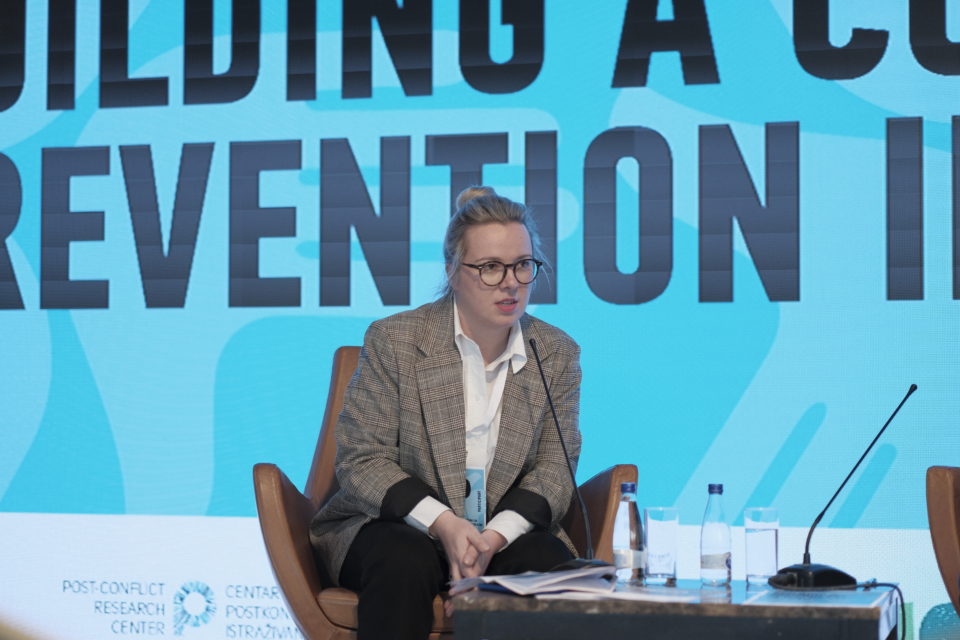
Vesna Teršalić from the Croatian peace center, Documenta, gave a clear word of caution on this issue. “Regarding the documentation of war crimes trials, you can imagine that what I speak about is complex, multilayered, needs additional contextualization, and (…) even in a year, you may want to add something. And that’s even when producing content in a classic form. But with formats as condensed as TikTok or Instagram, the task becomes more than difficult.”
Sofija Todorović from the YIHR Serbia, spoke about the need to raise awareness and change perceptions in order to confront the past based on facts.
“There is this mono-ethnic one-sided version of memory, there is this militarization, there are constantly war criminals all over the place and things like that. So actually, what we are trying to do in a way, is to somehow shift the paradigm,” emphasized Todorović.
Mirza Avdić from the Center for Investigative Journalism Sarajevo emphasized the importance of confronting hate speech in online media. Over the past two years, he explained that the center has noted 97 different cases of hate speech in online media in Bosnia and Herzegovina. These especially target issues of gender, ethnicity, and migration. The main actors in these narratives are political leaders, key decision-makers, and influencers.
Avdić emphasizes that there is currently no legal framework to combat hate speech in Bosnia and Herzegovina, and that the only possible course of action is to monitor such content to make the online space more aware.
____________________________________





